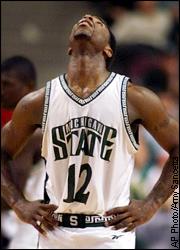Tough scheduling benefits Final Four teams
By Andy Katz
ESPN.com
AUSTIN, Texas -- The Final Four is set, but no one should be
surprised if they were paying attention to preseason predictions.
Yes, most of us were actually right back in October, it just took
awhile for it to materialize.
|  | | Mateen Cleaves and Michigan State weathered a tough schedule to make it to the Final Four. |
Michigan State, Florida and North Carolina were all consensus
preseason top-10 teams, each gaining strong support to make the Final Four. The
only team that wasn't on the radar screen was Wisconsin.
But, for some reason, we're conditioned to think that this Final
Four is flawed because these teams aren't perfect -- in fact, if you add up the four seeds, you get the highest total (22) since seeding began in 1979.
The teams' records, though, reflect a different mindset: tough scheduling during a time when programs have to rebuild quicker because of defections to the NBA, transfers and an
overall equality among most of the major conferences.
The four teams arrive in Indianapolis with 40 combined losses, the
most of any Final Four. But Wisconsin and North Carolina (13 losses) as well
as Michigan State and Florida (seven each) all played tough non-conference
schedules.
While the NCAA is trying to curtail exempted events in November and
December, these four teams are an example why playing more marquee,
made-for-TV matchups matter come March.
"This shows that teams are finally paying attention that you've got
to go out and play people," said Craig Thompson, the NCAA selection
committee chair, who took in his second net-cutting ceremony in as many
days in Austin, after being in Albuquerque, N.M., for the West final.
"We said that on selection Sunday that the reason teams like
Wisconsin and North Carolina were in the field is because they played
teams," Thompson said. "But you've got to win some of them too."
Thompson said while the combined Final Four has more losses than ever before, all that shows is that teams are playing better during the tournament than in the regular season -- which is all the committee wants when it puts the bracket together.
When an elite team like Michigan State plays consecutive games against
Kansas, Arizona and Kentucky, the Spartans are likely to incur a loss.
It was highly unlikely Wisconsin could survive Wake Forest, Syracuse, Texas and
Temple, and then a Big Ten schedule, without hitting double-figure
losses. Florida didn't shy away from playing DePaul in the middle of the
conference season.
North Carolina went through a stretch where it played Cincinnati,
Miami, Indiana and Louisville over five games. The Tar Heels also went to the Maui Invitational (playing USC, Georgetown and Purdue) and faced Michigan State in the ACC/Big Ten Challenge.
Coach Bill Guthridge admitted that he might have
overscheduled for this team, but didn't want to duck what has become a
Carolina tradition. Scheduling big-name opponents is commonplace at Carolina; losing
more than their share is rare. But it doesn't mean the Tar Heels, with 13 losses, should be looked at as any less of a contender. In this group, they're right in line.
"Obviously we would have liked to have won more games, but we're
better for that schedule," said North Carolina's Jason Capel. "We knew what
to expect in the tournament because we had been in these type of games."
All four battled inconsistencies during the season, lost a game or two when
they shouldn't have (remember Wright State over Michigan State?), but in the
end, got hot for four games like they were supposed to all along. The
Spartans were the only No. 1 seed to reach the Final Four, but the other
three all beat No. 1 seeds to get to Indianapolis (Wisconsin over Arizona in
the West; North Carolina over Stanford in the South and Florida over Duke in
the East).
The fact that two No. 8s (Wisconsin and North Carolina) and a No. 5
(Florida) advanced to the Final Four shouldn't matter, either. The selection
committee still got an underdog (the Badgers), one of the tradition-rich
ACC teams for the fourth straight year (North Carolina), a
favorite (Michigan State) and one of the hottest young teams (Florida).
See, everything worked out as it was supposed to, just like
we all said it would.
Yeah, right.
Andy Katz is a senior writer at ESPN.com.
|


